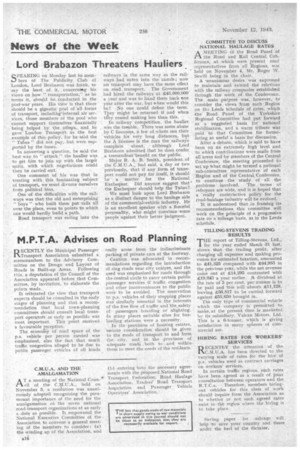Lord Brabazon Threatens Hauliers
Page 18

If you've noticed an error in this article please click here to report it so we can fix it.
SPEAKING on Monday last to members of The Publicity Club of London, Lord' Brabazon was frank, to say the least of it, concernimg his views on how " transportation," as be terms it, should be conducted in the post-war years. His view is that there should be a gigantic pool of 'all forms of transport, includihg 'internal air services, those members of the pool who cannot support themselves financially being helped by the othqrs,., and he gave London Tra.nspOrt as the best example of this policy, for he said the
Tubes " did mit pay, but were supported by the buses.
In answering a question, he said the best way to " attack-" the haulier was to get him to join up with the larger units, with which negotiations could then be carried .out.
One comment of his Was that in treating with this fascinating subject of transport, we must divorce ourselves from political bias.
• One of the difficulties with the railways was that the old and enterprising " boys " who built them put rails all over the place, even to points to which one would hardly build a path.
Road transport was eating into the
railways in the same Way as the railways had eaten into the -canals; now air transport may, have the same effect on road. transport. The Government had hired the railway§ at £43,000,000 a year and was to hand them back one year after the war, but when would this be? No one could define the term. They might be returnedif and when
they ceased making less than this. .
_In railway competition, the haulier was the trouble. There was some abuse by C licensees, a few of whom ran their vehicles for very long distances, but the A licensee is the man the railways complain about, although Lord Brabazon admitted that he doe confer , a tremendouS'benefit on the public.
Major R. A. B. Smith, president of the C.M.U.A.', had said, a day or two previously, that if any form of transport could not pay for itself, it should be a . matter for the National Exchequer. Did anyone suggest that the Exchequer should help the Tubes?.
We must look upon Lord Brabazon as a distinct danger to the haulage side of the commercial-vehicle industry, He is an excellent speaker with a forceful personality, who might convince 'some 'people against their better judgment. COMMITTEE TO DISCUSS NATIONAL HAULAGE RATES
AMEETINGof the Road Panel of the Road and Rail Central Con. ference, at. which were present road representatives from all Regions, was held on November 4, Mr. Roger W. Sewill being in the chair.
A -unanimous desire was expressed to maintain and extend the relation's with the railway companies established through the work of the Conference. The main purpose was, however, to consider the views from each: Region on the Leeds Schedule of rates, which . the Road Panel of the Yorkshire Regional Committee had put forward as a suggested basis for national stabilization, and a warm tribirte was paid to that Committee for formulating s6 useful a basis for discussion.
After a debate, which is said to have been On an extremely high level and to which contributions were made from all areas and-by members of the Central Conference, the, meeting proceeded to -set up What might be termed a national sub-committee representative of each RegiOn and of the Central. Conference, to continue the• study of all the problems involved. The terms of reference are wide, and it is hoped that a 'really conStructive policy for the road-haulage ialustry will be evolved.
is understood that in framing its recommendations this' committee will work on the principle of a progressive rate on a mileage basis, as in the Leeds schedule. . .




















































